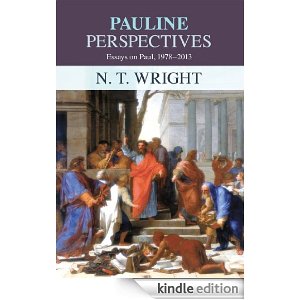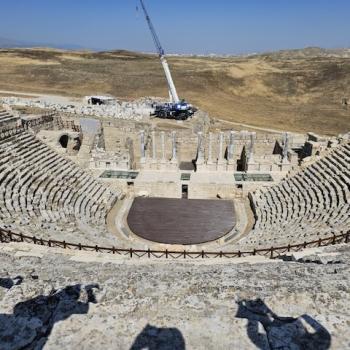BEN: One of your earliest important works was entitled The Climax of the Covenant. On the surface at least, this book seems rather different than your later work when it comes to ‘the New Perspective on Paul’, particularly on the issue of the so-called boundary defining things in early Judaism– circumcision, sabbath keeping, food laws. What was it that did or didn’t convince you about the arguments of Jimmy Dunn and others that when Paul refers to ‘works of the Law’ it is a sort of code language for these boundary markers of the Jewish faith? How would you view that issue now?
TOM: When I first developed my main proposals on Paul – i.e. in the mid-70s – I became convinced that the only way to make sense of Romans and Galatians without postulating a major and problematic change of mind on Paul’s part was to see his fundamental charge against his Jewish contemporaries – including his own former self – not as legalistic works-righteousness, i.e. trying to earn justification or salvation by good moral works, but as what I loosely called ‘national righteousness’. By that I meant the attempt to confine grace to one race. This is clear in the reading of Rom 10.2-3 which I (like some others) proposed: ‘seeking to establish their own righteousness’ meant ‘a righteousness for Jews and Jews only’. This is why they didn’t submit to ‘God’s righteousness’, to the righteous covenant plan of God as set out in 9.6-29, resulting in their failure to attain covenant membership while the Gentiles had done so (Rom 9.30f., where ‘righteousness’ MUST mean ‘covenant membership’, since Paul is here summing up what he’s said in 9.6-29, especially 9.24 where, as is well known, Paul includes Gentiles in the ‘call’ of God).
All this made, and makes, a whole lot of sense of the dense and difficult passages Rom. 3.21-31 (as a whole . . . far too many expositors see a sharp break between vv 26 and 27 but for Paul it’s all part of the same thing), and also Gal. 2.15-21. But to begin with, I kept stumbling over what then Paul meant by ‘works of the law’. Indeed, I recall explaining my ideas to Bishop Stephen Neill back in the late 1970s and he was very interested but said, ‘Then why did Paul say what he did about works of the law?’ At that time I had no good answer for that.
Then, after Jimmy Dunn had read my thesis in 1980 and began to develop his own version of what I had already called a ‘new perspective’, he proposed that by ‘works of the law’ Paul meant the ‘works’ which divided Jews from gentiles. Since I had already been thinking of that division as the thing which justification overcame in Rom 3 and Gal. 2.15-21 etc., it made very good sense. It still does – though of course as always with Paul his phrases are not mathematical symbols which always mean exactly the same thing. It depends on the context.
Jimmy and I have disagreed over how to interpret the key parallel phrase in 4QMMT. You need to look at our respective articles for details. I am convinced (a) that the parallel is important: these are the ‘works’ which mark out the true people of God over against others; (b) that the parallel is NOT exact because in Qumran the ‘works’ are marking out one set of Jews against another set of Jews, not (as in Paul) Jews from gentiles; (c) that the ‘works’ in question are therefore NOT the primary works of Mosaic Torah, as in Galatians etc., but are rather specific cultic regulations which will separate ‘true Jews’ from other Jews.
And of course, as Jimmy and I have, I think, both now said several times, though a primary emphasis in e.g. Galatians is on the ‘works’ that mark out Jew from Gentile (Sabbath, food, circumcision – and we might add Temple observance, endogamy, etc.), Paul is of course clear that anyone who takes on Torah is obliged to keep the whole thing, so that ‘works’ then become far wider in principle.
But the point would still stand: this is NOT a polemic against Pelagian or Arminian self-help moralism, to which the so-called ‘old perspective’ still clings rather frantically (and hence a covert plea for a kind of antinomianism – as has been all too common in western Protestantism), but rather a polemic against the ‘boasting’ that would set Israel according to the flesh inalienably above the Gentiles. This is so clearly in Ephesians 2.8-10, where ‘not of works, lest any should boast’ leads directly to the long exposition of the inclusion of the Gentiles . . .
By the way, Romans 4.4f. does NOT offer a good argument against this. See my article on Abraham, the last big piece in the Perspectives volume. ‘Reward’ there refers to the misthos of Genesis 15.1, which is the family God is promising Abraham – which is the subject of the whole of Romans 4 . . .
There is of course more to it than this (there always is with Paul), but not less. Hope this helps!














